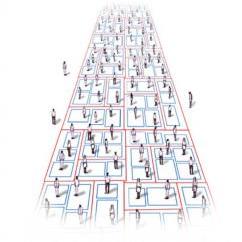
In announcing the Department of Homeland Security’s policy directive on June 15 stating that undocumented migrant youths who meet certain conditions would no longer be deported, President Obama said that “It was the right thing to do.” What he did not say was whether he meant “the right thing” legally or morally.
Obviously, he considered the action to be legal, even though this invocation of his administration’s power drew strong criticism from many, including Supreme Court Justice Antonin Scalia. But the president’s grounds for believing it moral were much less clear.
This should come as no surprise: the morality and politics of migration are among the most divisive issues in much of the world. In the United States, discussions of immigration flow seamlessly into matters of national security, employment levels, the health of the American economy, and threats to a presumptive American national identity and way of life. Much the same is true in Europe. Not a week goes by without a story of refugees from Africa or Asia perishing while trying to arrive at the shores of the European Union.
Nor are such developments restricted to the resource-rich countries of the Northern Hemisphere. The United Arab Emirates, Kuwait, Singapore, Israel and Jordan are countries with the highest percentage share of migrants among their total population, while the United States, the Russian Federation, Germany, Saudi Arabia, Canada and France lead in the actual number of international migrants. Migrations are now global, challenging many societies in many parts of the world.
Whereas from 1910 to 2012, the world’s population increased slightly more than fourfold, from 1.6 billion to to more than 7 billion, the number of people living in countries other than their own as migrants increased nearly sevenfold, from roughly 33 million to more than 200 million.
Migrations pit two moral and legal principles, foundational to the modern state system, against each other. On one hand, the human right of individuals to move across borders whether for economic, personal or professional reasons or to seek asylum and refuge is guaranteed by Articles 13 and 14 of the 1948 Universal Declaration of Human Rights. On the other hand, Article 21 of the declaration recognizes a basic right to self-government, stipulating that “the will of the people shall be the basis of the authority of government.” Under the current regime of states, that fundamental right includes control over borders as well as determining who is to be a citizen as distinguished from a resident or an alien.
The international system straddles these dual principles but it has not been able to reconcile them. The irony of global developments is that while state sovereignty in economic, military, and technological domains is eroded and national borders have become more porous, they are still policed to keep out aliens and intruders. The migrant’s body has become the symbolic site upon which such contradictions are enacted.
Why not advocate a “world without borders” then? From a moral point of view, no child deserves to be born on one side of the border rather than another, and it is deeply antithetical to our moral principles to punish individuals for what they cannot help being or doing. Punishment implies responsibility and accountability for one’s actions and choices; clearly, children who through their parents’ choices end up on one side of the border rather than another cannot be penalized for these choices.
A strong advocate of the right to self-government might retort that rewarding certain children for the wrongs committed by their parents, in this case illegal immigration, by legalizing undocumented youths is illogical as well as immoral and that “the right thing to do” would be to deport all undocumented migrants – parents and children alike. Apart from the sheer impracticality of this solution, its advocates seem to consider undocumented “original entry” into a country as the analog of “original sin” that no amount of subsequent behavior and atonement can alter.
But such punitive rigor unfairly conflates the messy and often inadvertent reasons that lead one to become an undocumented migrant with no criminal intent to break the law.
If conditions in a person’s native country so endanger his life and well-being and he becomes willing to risk illegality in order to survive, his right to survival, from a moral point of view, carries as much weight as does the new country’s claim to control borders against migrants. Immanuel Kant, therefore, called the moral claim to seek refuge or respite in the lands of another, a “universal right of hospitality,” provided that the intentions of the foreigner upon arriving on foreign lands were peaceful. Such a right, he argued, belonged to each human being placed on this planet who had to share the earth with others.
Even though morally the right to hospitality is an individual right, the socioeconomic and cultural causes of migrations are for the most part collective. Migrations occur because of economic, environmental, cultural and historical “push” and “pull” factors. “We are here,” say migrants, “because in effect you were there.” “We did not cross the border; the border crossed us.”
We do have special obligations to our neighbors, as opposed to moral obligations to humanity at large, if, for example, our economy has devastated theirs; if our industrial output has led to environmental harm or if our drug dependency has encouraged the formation of transnational drug cartels.
These claims of interdependence require a third moral principle — in addition to the right of universal hospitality and the right to self-government — to be brought into consideration: associative obligations among peoples arising through historical factors.
States cannot ignore such associative obligations. Migration policies, though they are often couched in nation-centric terms, always have transnational causes and consequences. It is impossible to address Mexican migration into the United States, for example, without considering the decades-long dependency of the rich California agricultural fields upon the often undocumented and unorganized labor of Mexican workers, some of whose children have now grown up to become “Dreamers” (so named after the Development, Relief, and Education for Alien Minors Act introduced to Congress in 2001). Among the three million students who graduate from United States high schools, 65,000 are undocumented.
The United States owes these young people a special duty of hospitality, not only because we, as a society, have benefited from the circumstances under which their parents entered this country, but also because they have formed strong affiliations with this society through being our friends, students, neighbors and coworkers. In a liberal-democratic society the path to citizenship must follow along these associative ties through which an individual shows him or herself to be capable and worthy of citizenship.
Migratory movements are sites of imperfect justice in that they bring into play the individual right to freedom of movement, the universal right to hospitality and the right of collectives to self-government as well as specific associative moral obligations. These rights cannot always be easily reconciled. Furthermore, international law does not as yet recognize a “human right to citizenship” for migrants, and considers this a sovereign prerogative of individual states. Nonetheless, the responsible politician is the one who acts with a lucid understanding of the necessity to balance these principles rather than giving in to a punitive rigorism that would deny, in Thomas Jefferson’s words, “the right which nature has given to all men of departing from [and I would add, from joining with] the country in which choice, not chance has placed them” (1774).
Whether or not President Obama considered all these moral aspects of the matter, his handling of this issue shows that he acted as a “responsible politician,” and not opportunistically as some of his critics charged. It was “the right thing to do.”
- Login to post comments



Recent comments
9 years 2 weeks ago
9 years 22 weeks ago
9 years 26 weeks ago
9 years 30 weeks ago
9 years 31 weeks ago
11 years 50 weeks ago
12 years 12 weeks ago
12 years 31 weeks ago